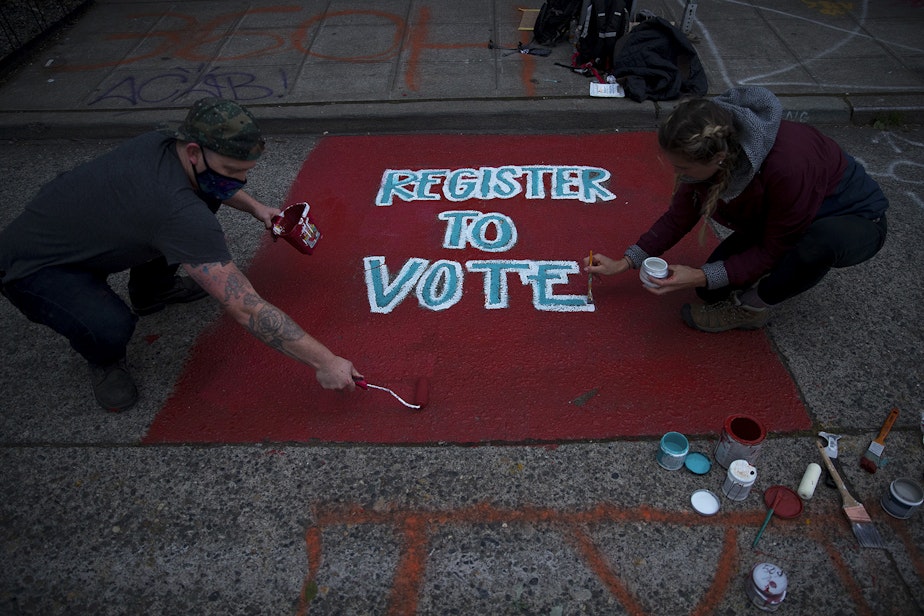Out of the election and into ... another election. This week in politics

Just when you thought you might catch a break from the rough edges of national politics, a new race is taking shape for Washington's 8th Congressional District seat.
Republican Matt Larkin (who ran for attorney general last year and lost) is taking on incumbent Democratic Representative Kim Schrier.
Larkin plans to zero in on the issues of homelessness, crime, and the idea of defunding police in nearby Seattle.
The latter is an ongoing conversation in Seattle, and will continue to be after a failed attempt to compromise over funding cuts this week.
If Larkin's focus on crime and homelessness in the 8th — and what incumbent, suburbanite Schrier has to do with it — surprises you, consider what Joni Balter told KUOW: "In some ways, defund [the police], rising crime and homelessness are obvious issues for the GOP to focus on.
Balter hosts Seattle City Club’s Civic Cocktail on the Seattle Channel.
"Republicans are going to have a hard time trashing Joe Biden and his programs to help Americans recover from the pandemic ... so Republicans are targeting [less popular] issues like defunding police and the idea of homeless people in parks."
National Republicans have already targeted this race, meaning Larkin can expect all the financial help he needs.
But Democrats will do the same for Schrier to hold onto her seat.
And they're likely to tie Larkin to former President Donald Trump, says Essex Porter, politics and government reporter for KIRO TV. It's a connection that Larkin seems to be avoiding at this point.
That's another advantage of positioning crime as a central part of his campaign. Balter says that gives Republican candidates a chance to change the subject from even more divisive topics, like the January 6 U.S. Capitol insurrection and the former president.
Meanwhile, the Seattle City Council is still at odds over cutting the Seattle Police Department's budget — by how much, when to do it, where the money should go and so on and so forth.
The Council voted 3-6 against an additional $2 million in cuts this week, though the "no" votes could not agree on why the proposal was wrong.
"This started as a $5.4 million cut to hold the department accountable for overspending its overtime budget during last year’s protests, it was whittled down to just $2 million. That was still too much for opponents and not nearly enough for others," Porter says, noting advocates have demanded the money be put toward services for people of color instead.
Balter, who has been critical of "defund the police" branding, suspects the word "defund" is starting to backfire to some degree.
At the very least, it has posed complicated questions about how to protect communities; consider crimes against people of Asian descent and how some police departments have diverted more resources into neighborhoods where people may be threatened more often.
One thing King County officials did agree on this week was that county agencies, including the sheriff's department, should not be using facial recognition technology. This week, the King County Council voted unanimously to ban its use, making it the first county in the nation to do so.
"Facial recognition software has become known more for its abuses than for any good it might do," Porter says.
That's because it's been known to misidentify Black and Asian faces, leading to false arrests and jail-time in some cases.
We don't yet know whether other counties will soon follow suit.
But Porter says the Washington chapter American Civil Liberties Union has been leading the charge against the technology and will likely persuade another county to adopt a similar ban.





